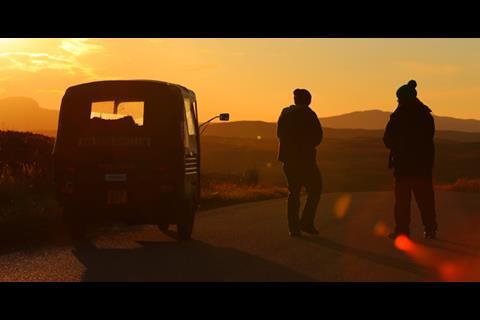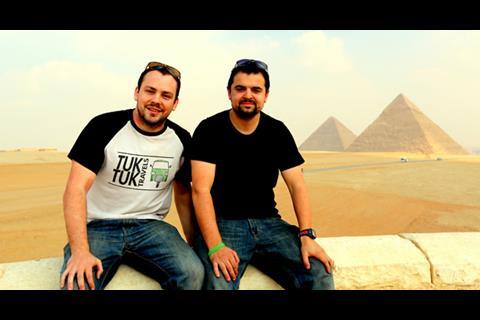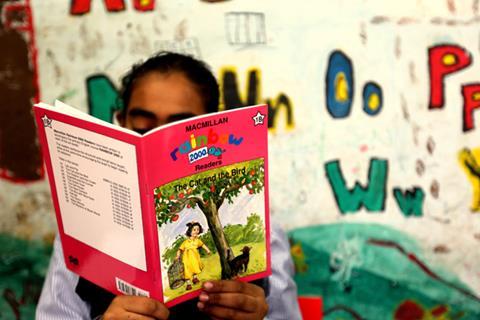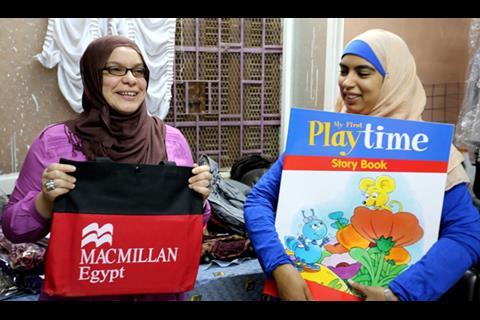In their first travelogue, our tuk tuk travellers explain their mission and visit a worthy project on the outskirts of Cairo.
As two teachers from the UK, we should probably be braving dark, cold, frosty mornings at this time of year – even a smattering of snow, perhaps – to complete the usual commute to school just outside London. Instead we find ourselves in the searing desert heat of Egypt, working our way down towards Sudan. We set off from the British Museum in August and have meandered over 7000 miles overland through Europe and Northern Africa, an adventure made all the more challenging by the wholly inappropriate nature of our vehicle – a tuk tuk.
Our aim is to drive around the world in this small, open-sided, three-wheeled vehicle, through Europe, Africa, Asia and the Americas, seeking to promote and advance education worldwide. One of our motivations for undertaking the endeavour was to visit grassroots educational projects and uncover some of the inspirational stories behind them; how individuals and communities are responding to the vast educational challenges facing the world today. In Cairo we were lucky enough to do just that.
Life in Stabl Antar, a shanty town in Southern Cairo, is precarious. Houses have been constructed over and around Al Zahraa rock; faults in the cliff face and weak composition of the rock itself make it susceptible to collapse and can cause heavy rock falls – one such tragedy claimed over 100 lives in 2008. Residents face a lack of running water, non-existent sewage system and limited waste collection; fixed employment is a rarity and incomes are very low (US$1.5-2.5 per family per day). The area also suffers from a lack of security, transportation and basic services. Children are largely malnourished and, if they succeed in completing primary education, are unlikely to graduate with the ability to read or write. Further educational opportunities are minimal and unlikely to be pursued considering the poor quality of education on offer, its cost and its questionable value in the (limited) job market.
Most Cairenes avoid such areas, rightly seeing them as breeding grounds of disease, crime and drug abuse. However, Ghada Gabr, an engineer who grew up near the area, saw something else: potential. When she founded Stabl Antar Dream it was a one classroom community school with 15 pupils in 2007; now it serves 100 boys and girls from the local area. With experience volunteering with street children in the past, Ghada recognised the importance of offering children the opportunity to develop skills, a trade or profession that will allow them to generate income. Half of the day is spent in the classroom, the other half reserved for vocational training: hand-weaving carpets, carpentry or candle-making. For Ghada, this vocational element is crucial, developing a child’s sense of pride in their work and their ability, boosting their self-confidence, and providing them with an income-generating opportunity.
Ghada has worked tirelessly, developing the community school, associated businesses and implementing adult literacy and health awareness programmes. Is she proud of the results? “They deserve better. They are not poor because they are lazy; they are poor because they didn’t have a chance,” she says, concluding “This is development – to make the most out of everyone”.
More details of our endeavour and the projects we visit can be found on our website – www.tuktuktravels.com. The best way to keep up to date with our progress is by ‘liking’ our Facebook page, ‘following’ us on Twitter or checking out our live map. If you’re interested, please do get in touch – we’d love to hear from you!
Tuk Tuk Travels

Two teachers, Nick and Rich, travelled around the world in a tuk tuk to visit charitable projects and promote English language teaching. We followed their adventures here on onestopenglish.
- 1
- Currently reading
Tuk Tuk Travels: Entry 1: An introduction
- 3
- 4
- 5
- 6
- 7
- 8
- 9
- 10
- 11
- 12
- 13
- 14
- 15
- 16









No comments yet